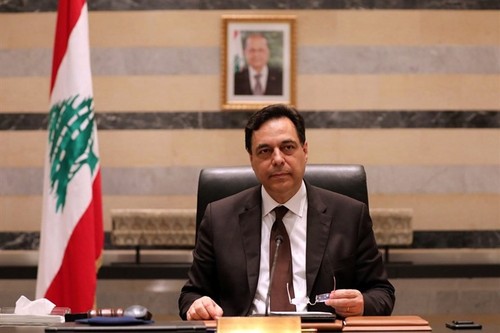 Lebanon's Prime Minister Hassan Diab announced his resignation on August 10, 2020. (photo: Reuters) Lebanon's Prime Minister Hassan Diab announced his resignation on August 10, 2020. (photo: Reuters) |
Prime Minister Hasan Diab announced his resignation on television, saying that the deadly explosion that damaged Beirut’s port and triggered public outrage last Tuesday was a result of corruption, incompetence, and negligence. The government’s resignation is seen as inevitable after the protests of the past week. 158 people were killed and more than 6,000 were injured in the explosion. More than half the city suffered damage and the economic loss is estimated at 5 billion USD.
Consequences
Before the Prime Minister, several key ministers, a senior assistant to the Prime Minister, and several senators resigned for reasons related to the blast, protestors took to the streets to demand the government take responsibility for the catastrophe. On Sunday they stormed the buildings of several government ministries in Beirut. A fire broke out at the entrance of the parliament building, where hundreds of protestors were breaking through security barriers. Lebanon’s National News Agency (NNAL) said many clashes occurred between protestors and police, who used tear gas to disperse the crowds. Hundreds of protestors and policemen were injured.
A challenging situation
President Michel Aoun’s acceptance of Prime Minister Hassan Diab’s resignation marks the beginning of a political crisis in Lebanon. The formation of a new government will be a challenging task in the face of deep divisions between political parties. In 2019 it took a month and a half to form the government of Prime Minister Diab. The election of incumbent President Michel Aoun lasted 29 months from May, 2014, to October, 2016.
Another challenge for the new government will be to resolve pending socio-economic problems, particularly severe due to the COVID-19 epidemic. Analysts say Lebanon’s economy, exhausted by corruption and COVID-19, will need massive financial assistance from the international community. Right now, with most countries struggling against the pandemic, it is unlikely there will be many generous offers.
Holding an early election is also a challenge for the new government. Before submitting his resignation, Prime Minister Diab said he will request an early parliamentary election in order to defuse the worsening crisis.
Analysts say if an early general election is held, the political situation in Lebanon will become much more complicated. An election will require a lot of resources and will almost certainly lead to controversies, even confrontations, between factions as has happened in many previous elections, not to mention possible intervention by the many regional forces who have influence and interests in Lebanon.